Is it really worth going after low search volume keywords with your content? Low search volume keywords are those keywords which get few monthly searches. You can find them using Google’s free keyword planner tool. As you type your main keywords into the planner, you’ll see a number of related keywords which are currently being search for on the search engine. The first keywords to come up are the most popular searches. The trouble with these keywords is that there’s huge competition for them. For example, using the main keyword from this site I would type “affiliate marketing” into the planner.
The top results are the most competitive (and most searched for) keywords which relate to my main keyword.
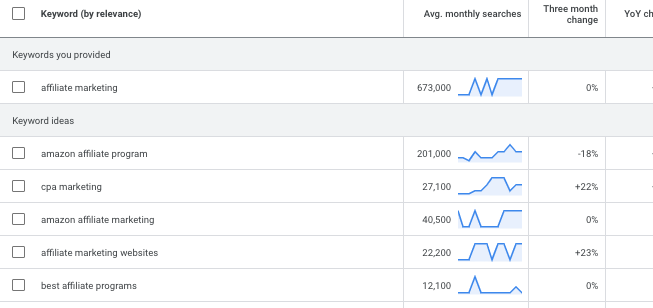
Low Search Volume Keywords: Competition
If I were to create content based around these kinds of keywords, I would have trouble getting found in the search results. For example, let’s look more closely at the keyword “Amazon affiliate program”. If we type this keyword into Google as a normal search, you’re likely to find a lot of competing information which would surely drown out any content you might create. Even a phrase match of the keywords (with the term in quotes) brings up thousands of competing pages for this particular search:
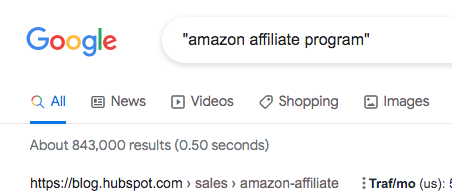
Want to get noticed with your content using the search engine results pages (SERPS)? If so, you’re far better off looking for longer tail keyword phrases with lower competition. These are also known as low search volume keywords.
Low Search Volume Keywords
While low search volume keywords don’t offer the same high volume of monthly traffic, they do offer less competition on the SERPS. This means you have a far better chance of ranking your content for them. You’re never guaranteed to rank your content on Google, Bing, Yahoo or Duckduckgo.com. However, a small chance of some traffic is worth more than no chance of high volume traffic!
Let’s use the same keyword “affiliate marketing”, but look for the longer tail keywords which offer lower competition. To do this I’ll use the keyword planner and click on the tab for Avg. Monthly Searches.
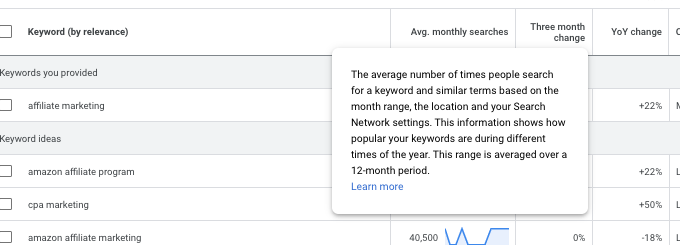
As a click on the tab, the average monthly search volume will change to eventually show the least searched for keyword terms. See below.
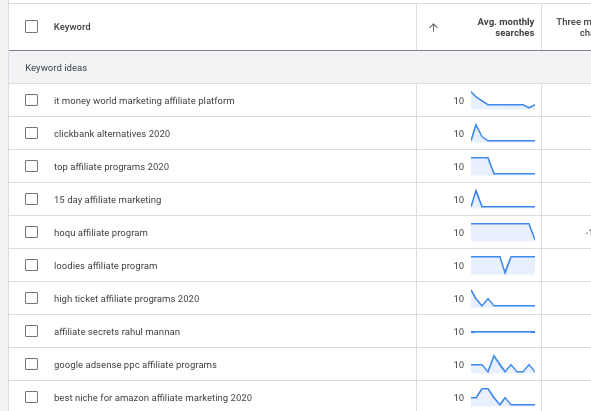
While these terms may not be exactly what we want as content creators, we are far closer to finding terms we can create content for. When we create content for the longer tail keywords with low SEO difficulty, we’re more likely to get our content ranking on the SERPS and get free traffic; if not from Google then from Bing, Yahoo and the other lesser used search engines. This is still traffic even though fewer people use these search engines than Google. If you use this tactic to create a lot of content, you increase your chances of building a nice flow of steady, free traffic to your website; potentially for years to come!
Low Search Volume Keywords: Finding Hidden Gems
At the bottom of the page of your keyword planner, you’ll find a tab where you can scroll through the pages of search results. Use this tab to scroll through and find keywords which might give you a chance of ranking some of your content.

I like to start with a search volume of at least 30 searches per month. Even if your content ranks at the top of Google for your chosen term, searches will be distributed between the top ranking pages. This means you’ll share those 30 visitors with other websites. You’ll only get a percentage of visitors (of the 30) per month even with a top listing.
Bing reports that websites on the top get only 42% of the traffic! The second gets 11% and the third only gets 8%. So, it clearly indicates why your websites needs to be on top. Other search engines will have a similar spread. With a top listing on Bing and only 30 visitors for a given search, you’ll only get around 12 visitors a month.
This means you’ll need to create a lot of content for many keywords in order to get the most from this tactic!
Domain Authority
As you get more domain authority over time, you may find your content is ranking better with the search engines. As this happens you can find that more competitive keywords are easier to compete for, given your authority. But in the first instance it’s a good idea to find the “low hanging fruit”!
The low hanging fruit are those keywords which have the least competition. Longer tail keywords will fall into this category. Short tail keywords are much more difficult to rank for because there’s so much competition. If you’re a new website, it’s also much harder to compete with sites that have been around a long time.
To check for the relative competition you can do a simple Google search for your chosen keyword. Let’s use the example from the above image “15 day affiliate marketing” and look on Google for competition. Here’s the results from a simple Google search:

Look at the number in the top under the search bar. 146,000,000. You can also do a phrase match search for greater clarity:
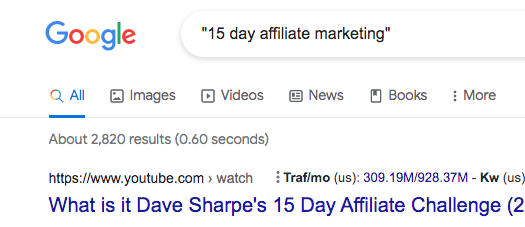
2,820 competing pages for this particular keyword phrase. This means it may be a good one to rank some content. However, did you spot the paid ads in the previous image?
This means people are paying to place adverts for this particular keyword and it might get in the way of your ranking. Also, there’s only 10 searches a month for this particular keyword. If you rank top on Bing, you’ll only get 4 searches a month! That’s not much for all your work! So it’s worth considering all these factors before you start writing your content! However, you may also attract visitors from other search engines, which can help to add to your multiple trickle of traffic.
With hundreds of pieces of content and through using this strategy over and over, you can ultimately build a lot of traffic to a website for free! It’s much more work than running a paid advert, but ultimately you can have free traffic and that’s well worth the effort in my view!
You’re so interesting! I do not believe I’ve read something like that before. So wonderful to find somebody with some original thoughts on this subject matter. Really.. thanks for starting this up. This website is something that’s needed on the internet, someone with some originality!